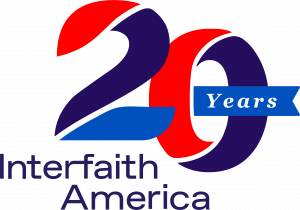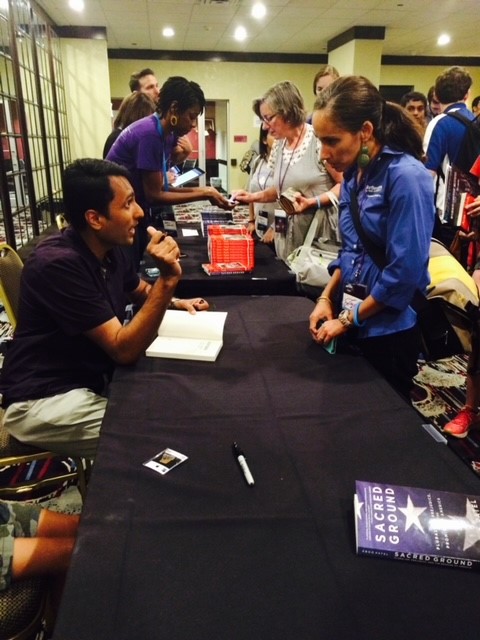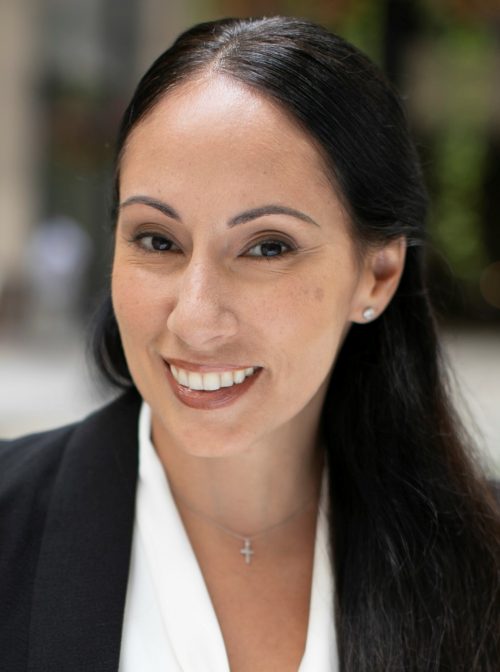To mark the 20th anniversary of Interfaith America, we spoke with individuals connected to the organization about their own interfaith work, memories of Interfaith America, and their hopes for the future of interfaith cooperation.
Interfaith America Magazine’s Allie Vroegop interviewed Dr. Janett Cordovés, the former Director of Higher Education Partnerships at Interfaith America and now the Senior Program Director for the Presidents Consortium at the Institute for Citizens & Scholars. The Institute seeks to develop citizens who are civically well-informed, productively engaged, and hopeful about the future. With her vast knowledge of university campus life, Cordovés shares how she is motivated to bring interfaith understanding to higher education and help higher ed partners support students’ whole selves.
This conversation was lightly edited for length and clarity.

Allie Vroegop: How did you start in interfaith work and how did you get connected with Interfaith America?
Janett Cordovés: This starts close to 20 years ago, I worked at Boston College as a residence hall director, there’s so many things in your portfolio, including being in charge for an entire campus. About two weeks into the job, I found myself with a student after having a nightmare of a situation unfold at the hospital. I’m sitting with her, waiting for her family to arrive and she asked me if I could pray with her. I said, “Absolutely. How do you pray?” In that question, I had the realization that I was not equipped to support this student religiously and the campus’ on-call structure was also not equipped to support this student. I didn’t have any imams, campus ministry, or any religious leaders in the community on call or part of the rotation, but I was certified and triage, CPR, first aid, emotional and psychological needs, but not religious needs. Soon after that incident, I was connecting with my Director of Residential Life and with campus ministry, I was thinking of accommodations. When [students] found themselves in situations that were troublesome, faith hadn’t been considered a resource, and so that became my work.
Soon after that, just in the field of higher education, I was started to be recognized for thinking about and training on this work, and I sat on the national board for the largest higher ed association’s, National Association of Student Personnel Administrators (NASPA), spirituality and religion knowledge community. It was there in 2015 that IA staff reached out to the spirituality and knowledge community and said, “We’d love your thoughts and feedback on this campus interfaith inventory.” And since then, I started crossing paths, and when I was doing the work with NASPA’s spirituality and religion community, I would invite Interfaith America’s team members to come and participate in our conversations. I put together the first higher ed conference hosted by NASPA on religious spirituality and secular identities and I invited IA’s staff to attend, present, and participate, and soon after that, I began my professional journey at the organization. For me, in the various roles that I was in, interfaith literacy, engagement, and leadership was not at the core, it was always on the peripheral. There was the opportunity six years ago, to make it part of my center, and that’s when I came to the organization.
AV: Is any special memory that you have of your time with the organization?
JC: Yeah, I feel really lucky that my portfolio has always had a component of travel, to visit campuses and see something come to fruition after ideating and planning for so long, is just remarkable. Visiting St. Olaf last year and seeing seven years of work move forward like with the interfaith skills in nursing and interfaith leadership in professional context. That started as part of the Institute on Interfaith Excellence a handful of years ago and building out an action plan saying, “We want to build a certificate, we want to build a minor, we want to build a center, we want to have Eboo Patel be our interfaith fellow.” We built out all these courses and online engagement opportunities, and so my work is so special and rewarding.
Personally, what really stands out to me because for me, I began at Boston College 20 years ago, is when individuals that work at Boston College now invite me back. A staff member there is now going through our Foundations of Interfaith course, and they invited me to give a keynote at the Jesuit association for student affairs professionals and do a lesson for the entire residential life staff. So, to return and be an expert in the field leading those conversations, feels very special to me.
Other moments are the first time I met Eboo [Patel] in person. I was working at Northeastern Illinois University in Albany Park neighborhood in Chicago. I brought a few of my students to the Interfaith Leadership Summit and when you meet, like researchers or scholars you’ve read, it’s exciting. Eboo started this foundation centering the importance of religious identity, and here I am doing my [similar] work on my own, I just felt such joy and connectedness, so that’s a very special moment for me, too.

AV: What about the organization’s work are you proud of?
JC: I’m so proud of the organization and the leaps and bounds that it has moved forward. The world is a better place because of Interfaith America. Some moments that I’m really proud of have come about in the last two years, like in the pandemic, we published the AAC&U publication on the work of our five years and our 50 campus partners doing interfaith cooperation at the strategic planning level, at the mission, public narrative, and research levels within the pandemic. The exodus of higher ed staff and the civil unrest and the racial injustice, and the infrastructure of higher education was really bending. People being let go, furloughed, asked to work from home, and then the emotional and spiritual capacity that they could have. That publication is something I’m so proud of, that we were able to do that and elevate and highlight the work out all these campus partners, like the unsung heroes who do this work. That was just a huge moment of pride for me.
I’m also really proud of the work that the HIV/AIDS and faith team was able to do – myself, Don Abram, and Noa Nakao – knowing little about health, public policy, and HIV/AIDS epidemic. We were talking with experts in theology, leadership, interfaith cooperation and leadership, and built the cohort. To be able to support the campus partners, the way we were welcomed into the community … I’m Christian so I feel like God was all over that, because to be able to build something like that, an infrastructure so strong in the pandemic, and in a new area of exploration and research, there had to be things that just opened and happened.
Organizationally, I cannot believe it but we’re a 50 person staff. I don’t know when it’s going to set in because I was part of it when we were 23! To see all these professionals, practitioners, theologians, scholars, artists, prioritize interfaith work cooperation and to really think about civic institutions and democracy is huge. I’m really proud of the work the organization has been able to do, what Eboo has been able to create, and the impact that we’re having.
AV: Is there anything you’re excited about or hopes you have for Interfaith America?
JC: With our work with civic institutions, I’m excited where that would unfold. With the ten thousand bridge builders that we’re building this year, and perhaps ten thousand more, what is that going to do for our communities? I’m excited about Christians and Muslims and Baháʼís and Zoroastrians talking and working together and minimizing or really eradicating cancel culture and having fruitful dialogue. I love what we’re doing with Bridging the Gap. Can we do that for a thousand colleges and universities in the U.S.? Can we match them up with universities, community colleges, vocational schools that have different political ideologies to work together and bridge that gap? I think there will be more interfaith fellows in higher education. I think more people will be doing their research and dissertation on interfaith engagement, interfaith cooperation and democracy. I look forward to reading through those! The future is wide, the future is big, and the future is better.




